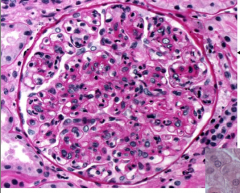![]()
![]()
![]()
Use LEFT and RIGHT arrow keys to navigate between flashcards;
Use UP and DOWN arrow keys to flip the card;
H to show hint;
A reads text to speech;
6 Cards in this Set
- Front
- Back
|
Glomerular Injury
|
Will have hypercellularity due to increased leukocytes due to inflammation.
Will have thickening of the BM, due to hyalnosis, which is deposit of hyaline, distance of filtration to occur becomes increased. Sclerosis - fibrotic tissue deposits |
|
|
Acute Proliferative (Poststreptoccocal Post infectious) GN
|
Inflammatory reaction to infection or injury at capillary wall. Inflammation of the wall, with deposits in the membrane, this would permit escape of blood, proteins from capillary to urinary space.
Will cause nephritic syndrome. |
|
|
Nephrotic Syndrome
|
Hematuria- blood in the urine
Oliguria - small volumes of volume being produced Hypertension - high blood volume Proteinuria - protein in urine Edema |
|
|
Characteristics of what can pass through basement membrane in nephron
|
1) Size - large particles cannot pass
2) Charge - heparin sulfate (is negative), other negatively charged particles cannot pass 3) Shape |
|
|
Antigen-Antibody Deposits
|
Occur from poststreptococcal infection. Deposits can occur either under your endothelial cells (subendothelial deposits), within the basement membrane (membranous - linear (rest granular), the mesangium (mesangial cells) or under the podocytes (sub epithelial deposits)
|
|
|
Inflammation of Glomerulus
|

Renal corpuscle with edema and increased in cellularity due to inflammation.
|

